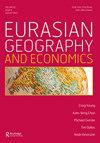On the (geo)political salience of geographical imaginations: a central European perspective
IF 2.2
2区 经济学
Q1 AREA STUDIES
引用次数: 3
Abstract
ABSTRACT This article introduces a Research Colloquium that investigates relationships between the production of Central European geopolitical imaginaries and processes of European integration. Specifically, we interrogate the ways in which Central European geopolitical imaginaries have involved the recasting of old and the emergence of new framings of regional identities, regional cooperation and geopolitical orientations. Our specific focus on Hungary is not coincidental; since 2010 the Hungarian government has pursued a strident and rather noisy ”geopoliticization” of its relations with the EU, its Central European neighbors and beyond. Together with Poland, Hungary has been an active producer of scenarios of national and European destiny according to conservative and often reactionary notions of identity and illiberal values. Contextual background explaining the rise of EU-skeptic imaginations of national purpose is provided and suggests that economic disparities as well as unresolved national tensions between liberalism and conservatism have been major drivers. As we will argue, stubborn reliance on fixed geopolitical ideas as a source of influence and power can lead to rigid commitments to identity politics that can both thwart more effective regional cooperation and harm national economic and political interests.论地理想象的(地理)政治显著性:中欧视角
摘要本文介绍了一个研究座谈会,该座谈会调查中欧地缘政治想象的产生与欧洲一体化进程之间的关系。具体而言,我们质疑中欧地缘政治想象如何涉及区域身份、区域合作和地缘政治方向的旧框架和新框架的重塑。我们对匈牙利的具体关注并非巧合;自2010年以来,匈牙利政府一直在对其与欧盟、中欧邻国及其他国家的关系进行尖锐而喧闹的“地缘政治化”。匈牙利与波兰一起,根据保守且往往是反动的身份观念和非自由价值观,一直是国家和欧洲命运场景的积极生产者。提供了解释欧盟怀疑论者对国家目标的想象兴起的背景,并表明经济差距以及自由主义和保守主义之间尚未解决的国家紧张关系是主要驱动因素。正如我们将要指出的那样,顽固地依赖固定的地缘政治思想作为影响力和权力的来源,可能会导致对身份政治的僵化承诺,这既会阻碍更有效的区域合作,也会损害国家经济和政治利益。
本文章由计算机程序翻译,如有差异,请以英文原文为准。
求助全文
约1分钟内获得全文
求助全文
来源期刊

Eurasian Geography and Economics
Multiple-
CiteScore
11.30
自引率
2.60%
发文量
85
期刊介绍:
Eurasian Geography and Economics, a bimonthly affiliated with the Kennan Institute for Advanced Russian Studies and the American Association for the Advancement of Slavic Studies , will publish timely, original papers in geography and economics covering all states of the former USSR as well as Asiatic and European countries on or beyond their present borders within the Eurasian realm , with a particular emphasis on China .
 求助内容:
求助内容: 应助结果提醒方式:
应助结果提醒方式:


